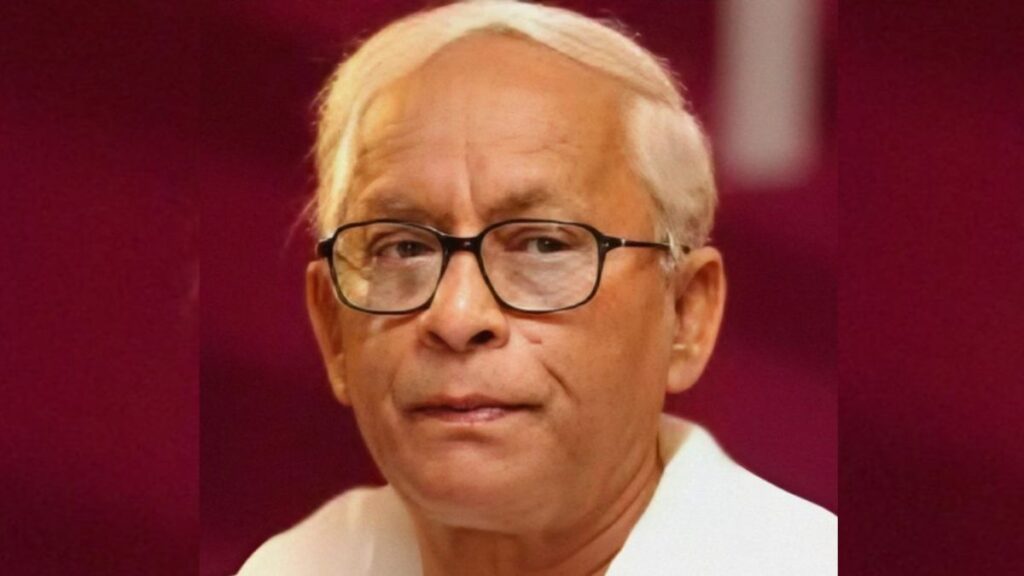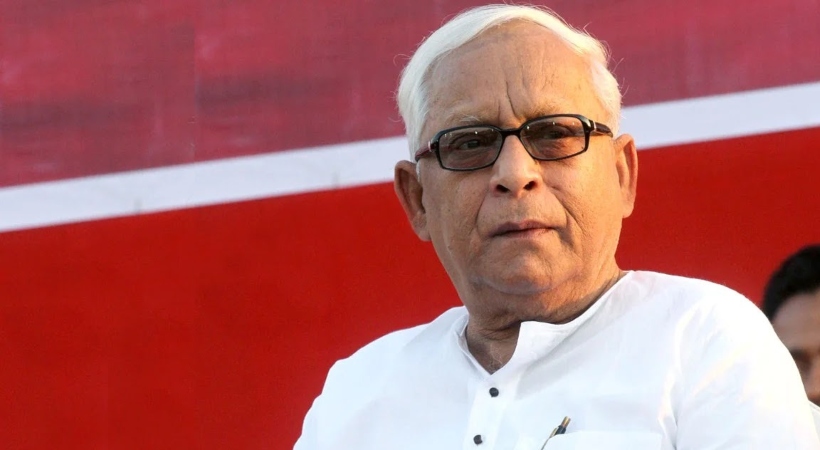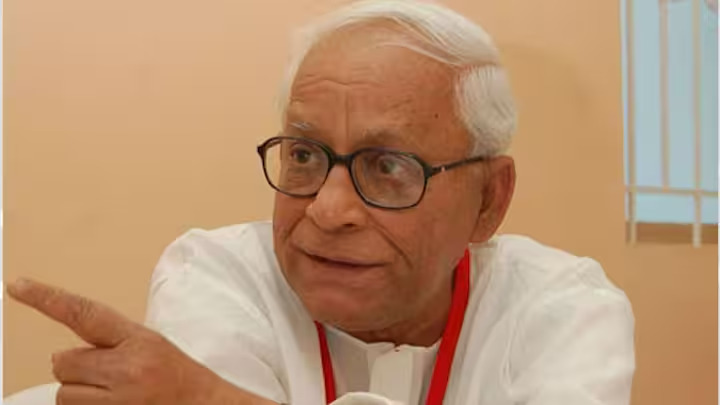Table of Contents
ToggleTop 10 Unknown Facts About Buddhadeb Bhattacharjee
Buddhadeb Bhattacharjee, a name that resonates with the political history of West Bengal, is known for his significant contributions as a leader of the Communist Party of India (Marxist) and as the Chief Minister of West Bengal from 2000 to 2011.

Although his public demeanor and political career are widely known, many aspects of his life are still less known. We shall explore ten lesser-known or obscure facts about Buddhadeb Bhattacharjee in this blog post, providing a more comprehensive understanding of the person behind the political icon.
Here’s Top 10 Unknown Facts about him:
1. Early Life and Intellectual Roots
On March 1, 1944, Buddhadeb Bhattacharjee was born into a family with deep cultural and intellectual traditions. Promode Bhattacharjee, his father, was a poet and a freedom fighter who passed away. Buddhadeb’s upbringing was greatly impacted by the literary background of his family and the beliefs of his father. His lifelong interest for cultural endeavors and his cerebral manner were affected by this early exposure to literature and the arts.
Even though Bhattacharjee was quite active in politics, he still had a strong passion for literature, especially Bengali literature. He was a passionate writer and reader who frequently found comfort in the written word. His writing endeavors were more than just a pastime; they were a way for him to express his intellectual curiosity and maintain a connection to his cultural background.
2. Literary Contributions
While many know Buddhadeb Bhattacharjee as a politician, few are aware of his contributions to Bengali literature. He is a published poet and has written several books and essays that explore various socio-political themes. His poetry, often reflective of his political ideology, also delves into the human condition, exploring themes of love, loss, and the passage of time.
His literary works are characterized by their depth and intellectual rigor, offering a glimpse into his reflective and introspective nature. Through his writings, Bhattacharya has made a significant contribution to Bengali literature, cementing his place not just as a political figure but also as a cultural icon.
3. A Reluctant Politician
Buddhadeb Bhattacharjee’s entry into politics was not driven by ambition but by a sense of duty. He was initially reluctant to join active politics, preferring to focus on his literary and cultural interests. However, the political climate of the time and the influence of his mentors, such as Promode Dasgupta and Jyoti Basu, led him to take the plunge into the political arena.
Even after joining politics, Bhattacharjee remained a reluctant politician, often shying away from the limelight. His colleagues often described him as a man of few words, who preferred to work behind the scenes rather than bask in the glory of public office. This reluctance, however, did not diminish his effectiveness as a leader, as he went on to become one of the most respected figures in West Bengal’s political history.
4. A Passionate Cinephile
Buddhadeb Bhattacharjee’s love for cinema is well-known among his close associates, but it remains a lesser-known fact among the general public. He is an ardent admirer of world cinema, with a particular fondness for the works of renowned filmmakers such as Satyajit Ray, Akira Kurosawa, and Ingmar Bergman.
His appreciation for cinema extends beyond mere admiration; Bhattacharjee has a deep understanding of the art form and often engaged in discussions about the nuances of filmmaking. His passion for cinema also influenced his political decisions, particularly in promoting the cultural and creative industries in West Bengal. Under his leadership, the state saw a resurgence in its film industry, with several initiatives aimed at supporting filmmakers and promoting Bengali cinema.
5. An Advocate for Cultural Renaissance
During his tenure as the Chief Minister of West Bengal, Buddhadeb Bhattacharjee was instrumental in promoting a cultural renaissance in the state. He believed that culture and education were the cornerstones of a progressive society, and he worked tirelessly to revive West Bengal’s rich cultural heritage.
Bhattacharya’s government launched several initiatives to support artists, writers, and filmmakers, creating an environment where creativity could thrive. He was also a strong advocate for preserving the state’s cultural institutions and worked to ensure that they received adequate funding and support. His efforts to promote culture were not limited to the arts; he also focused on improving the state’s educational infrastructure, believing that education was the key to unlocking the potential of future generations.

6. Controversial Industrial Policies
One of the most contentious aspects of Buddhadeb Bhattacharjee’s tenure as Chief Minister was his industrialization policies. In an effort to revive West Bengal’s economy, which had been stagnating for years, Bhattacharjee initiated a series of reforms aimed at attracting investment and promoting industrial growth.
His policies, however, were met with significant opposition, particularly from the rural population, who feared that their land would be taken away to make way for industries. The Singur and Nandigram incidents, where land acquisition for industrial projects led to violent clashes between the police and protesters, became defining moments of his tenure. These incidents tarnished Bhattacharjee’s image and led to widespread criticism, both from within his party and from the general public.
Despite the controversies, Bhattacharya remained steadfast in his belief that industrialization was necessary for the state’s development. He argued that without economic growth, it would be impossible to address the state’s unemployment and poverty issues. However, the backlash from his industrial policies ultimately played a significant role in the CPI(M)’s defeat in the 2011 state elections.
7. A Man of Simple Living
Buddhadeb Bhattacharjee is known for his simple and austere lifestyle, a rarity among politicians. Even during his tenure as Chief Minister, he lived in a modest apartment in South Kolkata, eschewing the trappings of power and luxury. He was known for his frugal habits, often traveling in economy class and avoiding unnecessary expenses.
His simplicity was not just a personal choice but a reflection of his Marxist ideals. Bhattacharjee believed in leading by example, demonstrating that public service should not be about personal gain but about serving the people. His commitment to simple living earned him the respect and admiration of his colleagues and constituents alike, reinforcing his image as a leader who was genuinely concerned about the welfare of the common man.
8. Health Struggles and Political Resilience
In recent years, Buddhadeb Bhattacharjee’s health has been a subject of concern. He has been battling chronic obstructive pulmonary disease (COPD), a condition that has severely impacted his mobility and overall health. Despite his health struggles, Bhattacharjeeremains resilient and continues to engage with the political landscape, albeit from the sidelines.
His declining health led to his gradual withdrawal from public life, but he remains a respected figure within the CPI(M) and continues to be consulted on important matters. Bhattacharjee’s resilience in the face of adversity is a testament to his dedication to his party and his unwavering commitment to his principles. Even as his physical health deteriorates, his intellectual and political acumen remain sharp, making him a revered elder statesman in Indian politics.

9. A Private Family Man
Buddhadeb Bhattacharjee is a deeply private individual, particularly when it comes to his family life. He has always kept his personal life away from the public eye, preferring to shield his family from the pressures and scrutiny that come with being a public figure.
Bhattacharjeeis married to Meera Bhattacharjee, and the couple has one daughter, Suchetana Bhattacharjee. Despite his busy political career, Bhattacharya has always made time for his family, often spending his free time reading or watching films with them. His commitment to his family is evident in the way he has managed to keep them out of the public spotlight, allowing them to lead relatively normal lives despite his high-profile career.
10. Legacy and Impact
Buddhadeb Bhattacharjee’s legacy is a complex one, marked by both achievements and controversies. As Chief Minister, he played a pivotal role in shaping the political and economic landscape of West Bengal, steering the state through a period of significant change. His efforts to promote industrialization, though controversial, were aimed at revitalizing the state’s economy and creating jobs for its people.
At the same time, Bhattacharjee’s tenure was also characterized by his unwavering commitment to cultural and educational development, reflecting his belief in the power of knowledge and creativity to drive societal progress. His contributions to Bengali literature and cinema further cement his legacy as a leader who valued culture as much as politics.
Despite the controversies that marred his political career, Buddhadeb Bhattacharjee remains a respected figure in Indian politics, admired for his intellectual rigor, simplicity, and dedication to public service. His life and career offer valuable lessons in leadership, resilience, and the importance of staying true to one’s principles, even in the face of adversity.
Conclusion
The life of Buddhadeb Bhattacharjee is a mosaic of deep encounters, scholarly endeavors, and difficult political situations. Although he is most known for his public character as a politician, his private life reveals a man of profound intelligence, cultural refinement, and moral rectitude. These little-known details about Bhattacharya contribute to our knowledge of his legacy and serve as motivation for anyone who aim to live honorably and purposefully in both their personal and professional life.

